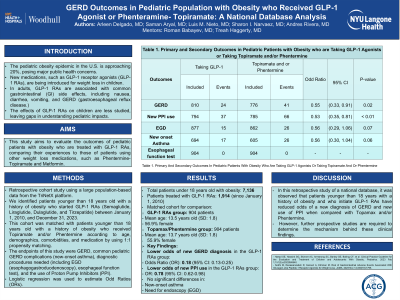Sunday Poster Session
Category: Pediatrics
P1463 - GERD Outcomes in Pediatric Population With Obesity Who Received GLP-1 Agonist or Phentermine-Topiramate: A National Database Analysis
Sunday, October 27, 2024
3:30 PM - 7:00 PM ET
Location: Exhibit Hall E

Has Audio

Arleen Delgado, MD
NYC Health + Hospitals/ Woodhull Medical Center
Brooklyn, NY
Presenting Author(s)
Arleen Delgado, MD1, Sharon Narvaez, MD2, Luis M.. Nieto, MD3, Saman Aryal, MD4, Andres Rivera, MD5, Treah Haggerty, MD6
1NYC Health + Hospitals/ Woodhull Medical Center, Brooklyn, NY; 2Universidad de Guayaquil, School of Medicine, Atlanta, GA; 3Emory University School of Medicine, Atlanta, GA; 4NYC Health + Hospitals/ Woodhull Medical Center, Queens, NY; 5Ann and Robert H. Lurie Children’s Hospital of Chicago, Chicago, IL; 6West Virginia University, Morgantown, WV
Introduction: The prevalence of gastroesophageal reflux disease (GERD) is less than 5% in early school-aged children and approximately 10% in children older than ten years of age. Studies show a link between obesity and GERD in adults, and some findings remain inconsistent in children. Therefore, we aim to evaluate the GERD outcomes of pediatric patients with obesity taking Glucagon-Like Peptide-1 receptor agonists (GLP-1 RAs) when compared with Phentermine-Topiramate, which are common drugs utilized for weight loss in the pediatric population.
Methods: We performed a retrospective cohort study utilizing large population-based data from the TriNetX platform. We identified patients younger than 18 years with a history of obesity who started GLP-1 RAs (Semaglutide, Liraglutide, Dulaglutide, and Tirzepatide) between January 1, 2010, and December 31, 2023. This cohort was matched with patients younger than 18 years with a history of obesity who received Topiramate and/or Phentermine according to age, demographics, comorbidities, and medication by using 1:1 propensity matching. The endpoints of this study were GERD, common pediatric GERD complications (new onset asthma), diagnostic procedures needed (including esophagogastroduodenoscopy (EGD) and esophageal function test), and Proton Pump Inhibitors (PPI) use. Logistic regression was used to estimate odd ratios (ORs).
Results: A total of 7,136 patients younger than 18 years with history of obesity were identified, 1,914 of these individuals received GLP -1 RAs at some point since January 1, 2010; 904 out of 1,914 (mean [SD] age, 13.5 [1.8] years; 514 [56.9%] female) were matched with 904 individuals (mean [SD] age, 13.7 [1.8] years; 505 [55.9%] female) who received Topiramate and/or Phentermine. The GLP-1 RAs group had significantly lower odds of new diagnosis of GERD (ORs, 0.18; 95% Confidence Interval [CI], 0.13-0.25) and lower odds of new PPI use (ORs, 0.78; 95% CI, 0.62-0.98). No differences were found in the incidence of new-onset asthma and the need for EGD; however, there was a tendency to favor using GLP-1 RAs.
Discussion: In this retrospective study of a national database, it was observed that patients younger than 18 years with a history of obesity and who initiate GLP-1 RAs have reduced odds of a new diagnosis of GERD and new use of PPI when compared with Topiramate and/or Phentermine. However, further prospective studies are required to determine the mechanism behind these clinical findings.
Note: The table for this abstract can be viewed in the ePoster Gallery section of the ACG 2024 ePoster Site or in The American Journal of Gastroenterology's abstract supplement issue, both of which will be available starting October 27, 2024.
Disclosures:
Arleen Delgado, MD1, Sharon Narvaez, MD2, Luis M.. Nieto, MD3, Saman Aryal, MD4, Andres Rivera, MD5, Treah Haggerty, MD6. P1463 - GERD Outcomes in Pediatric Population With Obesity Who Received GLP-1 Agonist or Phentermine-Topiramate: A National Database Analysis, ACG 2024 Annual Scientific Meeting Abstracts. Philadelphia, PA: American College of Gastroenterology.
1NYC Health + Hospitals/ Woodhull Medical Center, Brooklyn, NY; 2Universidad de Guayaquil, School of Medicine, Atlanta, GA; 3Emory University School of Medicine, Atlanta, GA; 4NYC Health + Hospitals/ Woodhull Medical Center, Queens, NY; 5Ann and Robert H. Lurie Children’s Hospital of Chicago, Chicago, IL; 6West Virginia University, Morgantown, WV
Introduction: The prevalence of gastroesophageal reflux disease (GERD) is less than 5% in early school-aged children and approximately 10% in children older than ten years of age. Studies show a link between obesity and GERD in adults, and some findings remain inconsistent in children. Therefore, we aim to evaluate the GERD outcomes of pediatric patients with obesity taking Glucagon-Like Peptide-1 receptor agonists (GLP-1 RAs) when compared with Phentermine-Topiramate, which are common drugs utilized for weight loss in the pediatric population.
Methods: We performed a retrospective cohort study utilizing large population-based data from the TriNetX platform. We identified patients younger than 18 years with a history of obesity who started GLP-1 RAs (Semaglutide, Liraglutide, Dulaglutide, and Tirzepatide) between January 1, 2010, and December 31, 2023. This cohort was matched with patients younger than 18 years with a history of obesity who received Topiramate and/or Phentermine according to age, demographics, comorbidities, and medication by using 1:1 propensity matching. The endpoints of this study were GERD, common pediatric GERD complications (new onset asthma), diagnostic procedures needed (including esophagogastroduodenoscopy (EGD) and esophageal function test), and Proton Pump Inhibitors (PPI) use. Logistic regression was used to estimate odd ratios (ORs).
Results: A total of 7,136 patients younger than 18 years with history of obesity were identified, 1,914 of these individuals received GLP -1 RAs at some point since January 1, 2010; 904 out of 1,914 (mean [SD] age, 13.5 [1.8] years; 514 [56.9%] female) were matched with 904 individuals (mean [SD] age, 13.7 [1.8] years; 505 [55.9%] female) who received Topiramate and/or Phentermine. The GLP-1 RAs group had significantly lower odds of new diagnosis of GERD (ORs, 0.18; 95% Confidence Interval [CI], 0.13-0.25) and lower odds of new PPI use (ORs, 0.78; 95% CI, 0.62-0.98). No differences were found in the incidence of new-onset asthma and the need for EGD; however, there was a tendency to favor using GLP-1 RAs.
Discussion: In this retrospective study of a national database, it was observed that patients younger than 18 years with a history of obesity and who initiate GLP-1 RAs have reduced odds of a new diagnosis of GERD and new use of PPI when compared with Topiramate and/or Phentermine. However, further prospective studies are required to determine the mechanism behind these clinical findings.
Note: The table for this abstract can be viewed in the ePoster Gallery section of the ACG 2024 ePoster Site or in The American Journal of Gastroenterology's abstract supplement issue, both of which will be available starting October 27, 2024.
Disclosures:
Arleen Delgado indicated no relevant financial relationships.
Sharon Narvaez indicated no relevant financial relationships.
Luis Nieto indicated no relevant financial relationships.
Saman Aryal indicated no relevant financial relationships.
Andres Rivera indicated no relevant financial relationships.
Treah Haggerty indicated no relevant financial relationships.
Arleen Delgado, MD1, Sharon Narvaez, MD2, Luis M.. Nieto, MD3, Saman Aryal, MD4, Andres Rivera, MD5, Treah Haggerty, MD6. P1463 - GERD Outcomes in Pediatric Population With Obesity Who Received GLP-1 Agonist or Phentermine-Topiramate: A National Database Analysis, ACG 2024 Annual Scientific Meeting Abstracts. Philadelphia, PA: American College of Gastroenterology.
